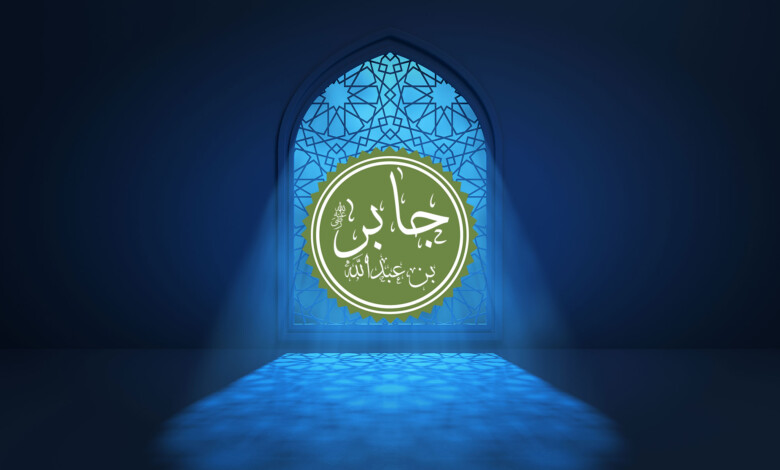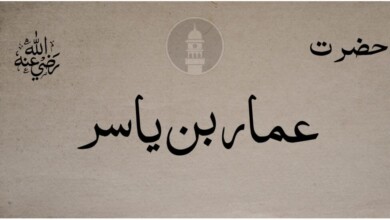Jabir ibn Abdullah, the first child Ansar to accept Islam

Jabir ibn Abdullah; the first child Ansar to accept Islam
Jabir bin Abdullah al-Ansari was born in Yathrib (present day Madinah) about 15 years before the great Hijra (Prophet Muhammad and the Muslims’ migration from Makkah to Madinah.
He belonged to a poor family from the tribe of Khazraj. His father, Abdullah bin Amr bin Haram, according to some account, was among the first 12 members of Aws and Khazraj clans of Madinah who converted to Islam after meeting Prophet Muhammad at Aqaba near Makkah in 621 AD.
The following year, a bigger delegation from Madinah entered into the second pledge of Aqabah which laid the foundation for the Muslim’s migration from Makkah to Madinah. According to some sources, the delegation comprised of seventy-two men and two women – among them was a 7-year-old boy, Jabir ibn Abdullah. At that tender young age, he took the oath of allegiance to Prophet Muhammad and thus became a Muslim as a boy.
He loved the Prophet dearly and kept close to him ultimately becoming one of the most prominent narrators of Hadith. He is recognized as the Prophet’s companion with the most count of hadith relating to Hajj.
Jabir bin Abdullah also had a scientific reputation among the companions. According to Hisham ibn Urwah, he conducted teaching circles within the Prophet’s Mosque, focusing on the Quran. Jabir was known as an authority on Islamic jurisprudence.
He known to have participated in several expeditions of the Muslim army under the command of the Messenger of Allah (peace be upon him). One key battle he did not participate in was the battle of Uhud. When his father, Abdullah ibn Amr joined the Muslim army in the battle of Uhud, he left Jabir to take care of the family. Abdullah had 12 daughters, Jabir was the only son.
Abdullah Ibn ‘Amr was martyred at Uhud which saddened Jabir so much because he had been left with the burden of caring for his sisters and paying back his father’s debts.
His worries did not go unnoticed by the Prophet (peace be upon him), who asked, “Why do I see you so sad?” Jabir replied, “My father was slain in Uhud, and he left behind many children and a large debt.” The Prophet comforted him, saying his father was among the martyrs, and recited Allah’s words: “And never think of those who have been killed in the cause of Allah as dead. Rather, they are alive with their Lord, receiving provision…” [Quran 3:169]. Jabir’s heart lightened upon hearing these verses.
Jabir married a widow older than him, despite being young and able to marry a younger woman. He chose her because she could better help him raise his younger sisters. However, his worries persisted, as he still had to fulfill his father’s debt. His father had left behind only a small palm grove, which barely yielded enough fruit to feed them.
Jabir sought the Prophet’s help, saying, “People are knocking at my door, asking me to pay my father’s debt. Would you please come with me so that the creditors would not be harsh to me?” The Prophet replied, “I will come soon. Go now and sort your dates.” As Jabir sorted his dates, people rushed to him, but upon hearing the Prophet’s name, they refrained from talking, except for one Jew who refused to wait.
The Prophet arrived, sweat dripping from his forehead, and asked the Jew to accept partial payment and postpone the rest. The Jew refused, and the Prophet invoked Allah’s blessing on the dates. He then told Jabir to measure the dates for his creditors. Miraculously, the piles of dates remained abundant even after Jabir had paid off his father’s debt.
Jabir had missed many battles due to his father’s orders to care for his sisters. However, after his father’s death, Jabir participated in every expedition, including the battle of Thatur-Riqaa’. During their return, the Prophet noticed Jabir’s slow camel and offered to help. The Prophet lightly hit the camel with a stick, and it suddenly gained new life, outrunning the other camels.
The Prophet asked Jabir to sell him the camel, and after some negotiation, they agreed on a price. However, when Jabir went to hand over the camel, the Prophet surprised him by returning the camel and the payment. The Prophet explained that his intention was not to take the camel away from Jabir but to demonstrate his generosity.
Jabir took great care of his camel, which remained at his service during the Prophet’s lifetime and under Caliph Abu Bakr. When the camel grew old, Caliph Abu Bakr told Jabir to let it graze freely.
He lived through the time of the four rightly guided Caliphs; Abubakr al-Siddiq, Umar bin Khattab, Uthman bin Affan and Ali bin Abu Talib. He died in 78 AH (697AD) at the age of 94 in Madinah.


